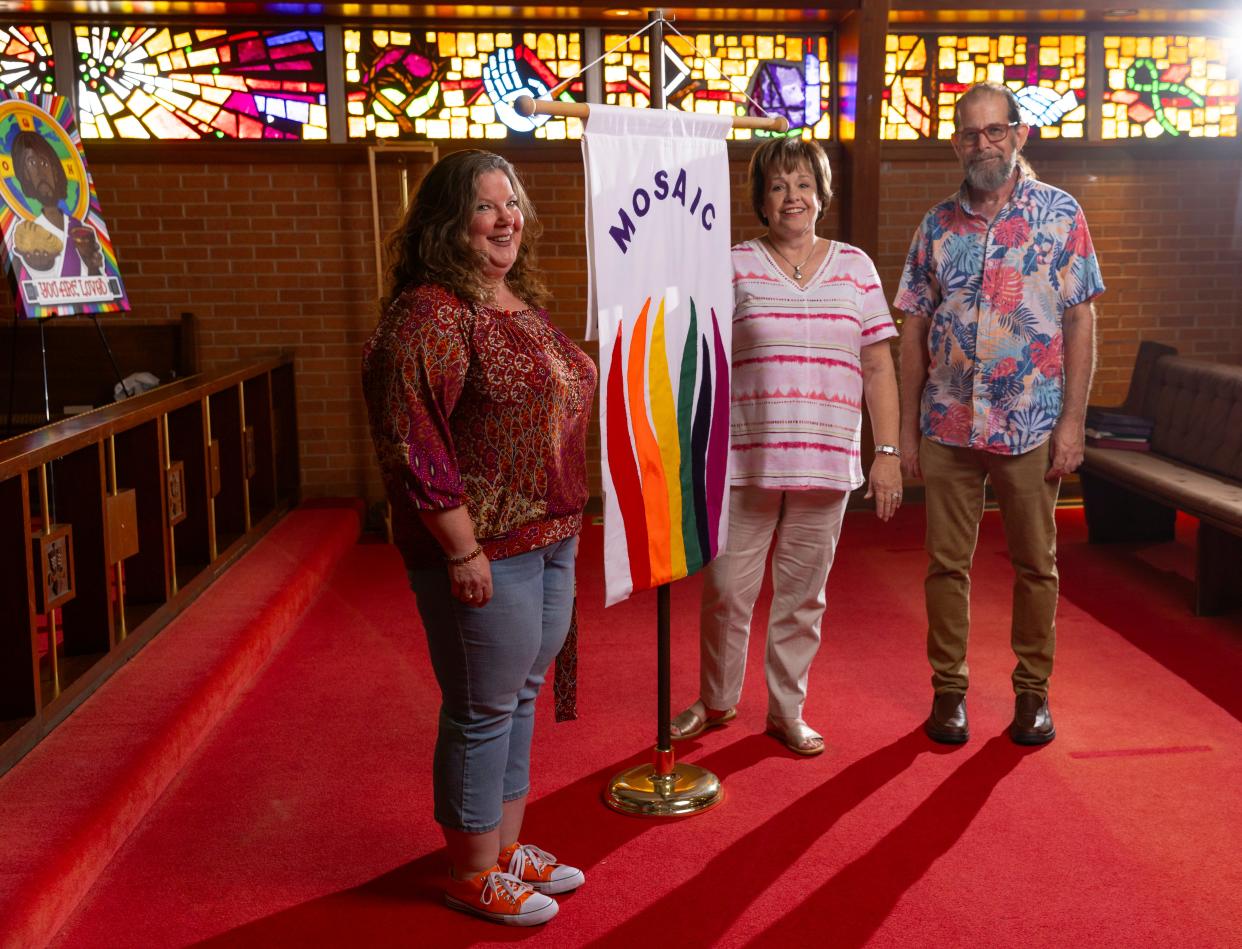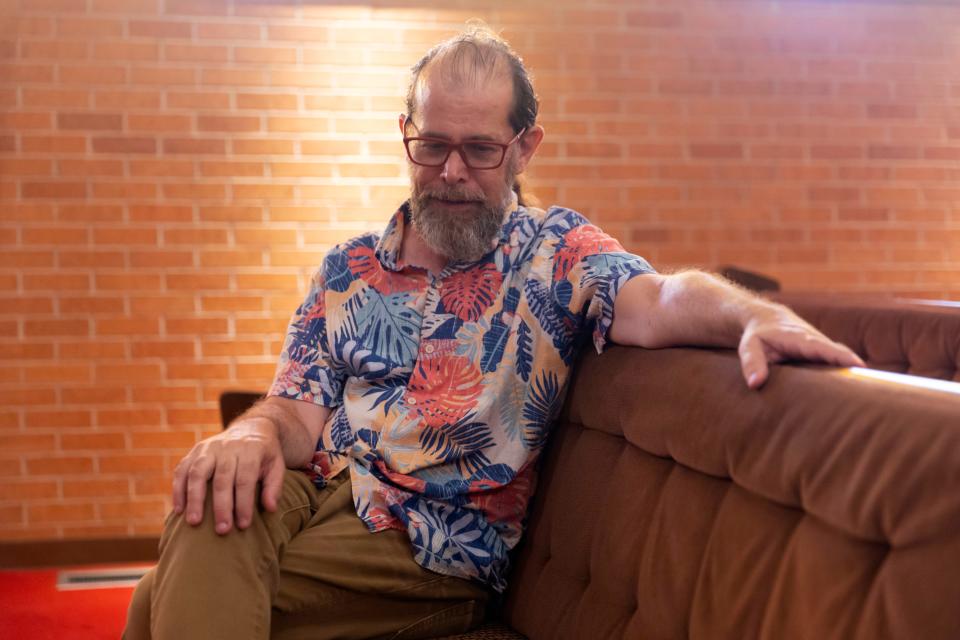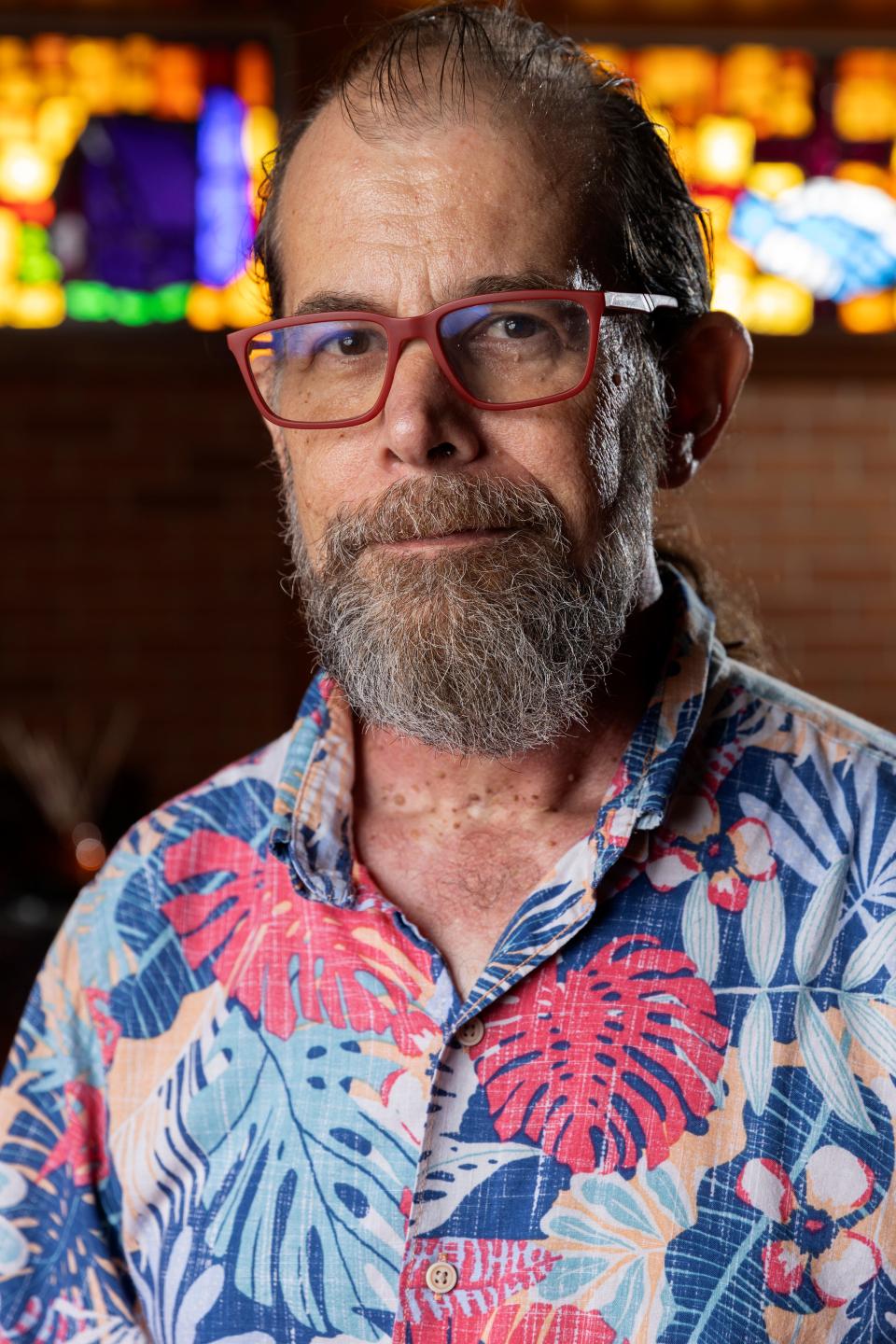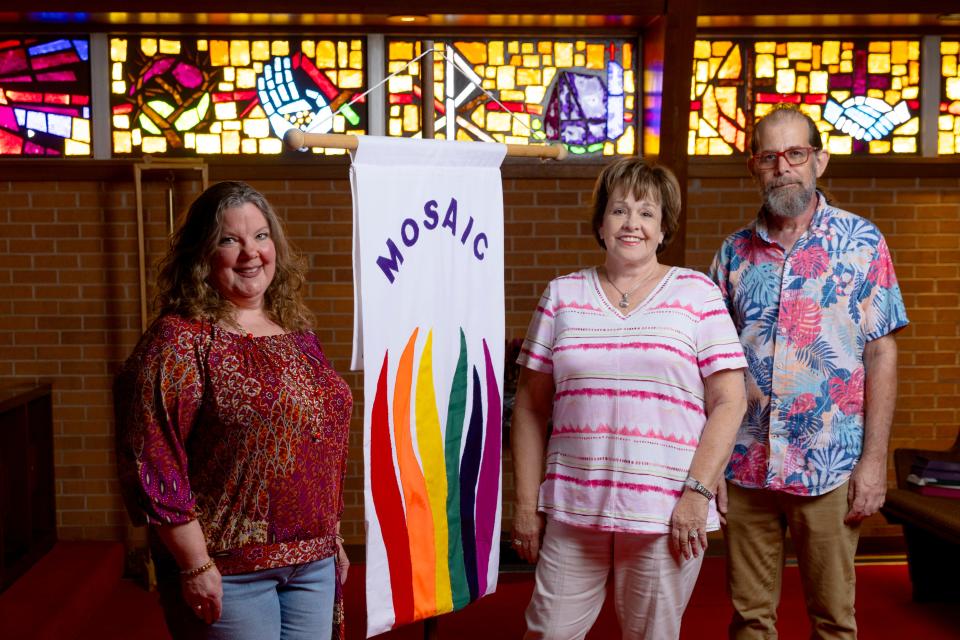In United Methodist disaffiliation, exiting liberal churches a surprising minority

As the schism in the international United Methodist Church widens, more and more conservative congregations are heading for the exit doors in a trend that has confounded those on the outside looking in.
Why are conservative houses of worship leaving the denomination when they generally agree with the denomination's ban on same-sex marriage and gay ordination? Why aren't more liberal churches departing ― after all, many of them have been expressing their opposition to the prohibition for years?
Into this conundrum comes Mosaic United Methodist Church, 3131 NW 50. The congregation's leaders said they can't speak for other churches that have been fighting for LGBTQ+ equality, but they can share why they now want out.
"We're tired," said the Rev. Glenda Skinner-Noble, 50, Mosaic's associate pastor.
Nearly 100 churches have sought to leave UMC, but Mosaic is only second to want more LGBTQ+ inclusion
Mosaic is only the second of 84 congregations in Oklahoma seeking an exit because church members want to be more inclusive to the LGBTQ+ community. Notably, St. Luke's disaffiliated in April for similar reasons, but unlike St. Luke's, 222 NW 15, Mosaic members have publicly advocated for the LGBTQ+ community since the church evolved from the now defunct Epworth United Methodist. Epworth was and Mosaic is a member of the Reconciling Ministries Network of churches, individuals and faith groups working toward the full inclusion of the LGBTQ+ community in the United Methodist Church.
Mosaic leaders said the congregation is choosing to exit before a special provision ends on Dec. 31, which allows United Methodist churches in disagreement over human sexuality to take their property and assets with them when they sever ties with the denomination. One leader said the provision, known as Paragraph 2553, was created with LGBTQ+-affirming churches like Mosaic in mind.
More: What we know: Oklahoma churches seeking to cut ties with United Methodist denomination
"I feel like we were the type of church that this was designed for," said Susan Humphrey, 70, a Mosaic church council member.
"We have discussed this for so long, and it's taken a lot of our focus and energy. Now that we've made this decision, I personally feel like we are free to be who we are."
The church recently held a congregational vote, and 89. 7% of the church members voted in favor of disaffiliation, meeting the two-thirds majority vote required by the Oklahoma United Methodist Conference under a Paragraph 2553 disaffiliation agreement. Mosaic will be among a group of churches hoping to have their disaffiliation requests ratified by Oklahoma United Methodist Conference delegates on Oct. 13-14 at a special disaffiliation meeting. This ratification must occur before churches may formally separate from the denomination.

The Rev. Scott Spencer, Mosaic's senior pastor, agreed with Skinner-Noble's summary of the congregation's sentiments.
"Many of the people at Mosaic were part of Epworth, and they've been sort of working on this since at least 1995," he said. "Some of those people were the ones that just said 'we're tired and we're ready for change.'"
An Oklahoma United Methodist Conference leader who has been working with disaffiliating congregations shared an assessment about the "gracious exit" provision that lined up with Mosaic leaders' views.
"Paragraph 2553, the legislation that narrowly passed by the worldwide General Conference of the UMC in 2019, was intended to allow a gracious exit with property and assets held in trust for the whole UMC for congregations that were in disagreement with the current position of the church on homosexuality. The current stance is not to allow our clergy to officiate same gender weddings or to allow the ordination of 'self-avowed practicing homosexuals,'" Patricia "Tish" Malloy, the conference's director of transitional ministries, said in an email.
More: Why we stay: Preachers explain why they won't cut United Methodist ties
Malloy said the legislation allowed congregations that voted by a 2/3 majority of present members to request ratification of their vote by their area conference and the conference to determine whether to or not to release the property and assets of that church to the congregation.
"Of course, anyone can decide that they do not approve of a denomination's position on any matter and leave, but this legislation really was originally intended to allow congregations that were predominantly supportive of full inclusion of homosexual people to leave the UMC and own buildings and other assets as a gift from the UMC," she said.

Meanwhile, Spencer, 55, said he felt his church's situation was different from that of some of his colleagues' churches where people haven't been struggling against the denomination's same-sex marriage/gay ordination ban for a lengthy time period.
"I think that's a key difference," he said. "You know, Epworth was the first Reconciling church in Oklahoma, and I think that the people in the pews were just ready for a change."
Was the exit offer from UMC meant as an 'exit ramp' for LGBTQ+-affirming churches?
While Oklahoma United Methodist Conference leaders declined to comment on whether Paragraph 2553 was inherently designed for LGBTQ+-affirming churches like Mosaic, a local minister who leads another Reconciling Ministries Network church shared her thoughts on the matter.
The Rev. Trina Bose North, senior pastor of Crown Heights United Methodist Church, said she was a non-voting attendee of the General Conference gathering in 2019 in St. Louis, where delegates adopted Paragraph 2553, and she's certain that the special provision's initial premise was not geared for conservative churches who embraced the same-sex marriage/gay ordination ban and the penalties for violators of the prohibition.
"It was an exit ramp for churches who did not want to comply with the Book of Discipline (the denomination's policy book) ― the ban on same-sex marriage," North said.
More: Mosaic hosts 'Resist Service' Methodist crowd gathers in solidarity with LGBTQ community
But, "it's not the liberals who are using it (Paragraph 2553) en masse, it's the conservatives," she said.
Numerous conservative churches are leaving instead of more liberal churches because the conservatives are concerned about the denomination's possible move more to more left-leaning or liberal side, and the minister said this line of thinking is with good reason.
There are signs pointing to a more liberal shift in the denomination, and this could come as quickly as 2024, when the United Methodist's General Conference delegates gather once again, North said.
Conservatives have complained that United Methodist bishops across the country have not handed out appropriate punishments for clergy who have officiated at same-sex weddings. North said this could be happening because the denomination is expected to take up a more inclusive stance in 2024.

Also, she said United Methodist regional conferences in Africa were adamantly against overturning the same-sex marriage/gay ordination ban in 2019, which came as no surprise because these regional bodies are generally conservative and homosexuality is against the law in some African countries. But North said the bishop of one of the African regions recently voiced support for a measure called the "regionalization plan," that would allow each region of the denomination to decide for themselves how they will deal with same-sex marriage and gay ordination, while continuing to stay connected to the international denomination.
"This is a graceful way to give each region the autonomy to reach its mission field," she said, paraphrasing the African leader.
More: Oklahoma City area church joins Reconciling network
"So, something significant is already happening, and it's everything that brings me hope."
North said she's sad that Mosaic has decided to leave the United Methodist Church. Crown Heights and Mosaic are two of the three Reconciling Ministries Network churches in Oklahoma City and she said it has been nice to have several like-minded congregations advocating for the same cause of equality and inclusion. Quail Springs United Methodist Church, is the third Oklahoma City church in the Reconciling network. Another Reconciling network member, St. Stephen's United Methodist Church, is in Norman.
North said Mosaic might not have had to wait much longer to reach the "finish line."
"We are within arm's reach of equality," she said.
"We see the writing on the wall that inclusion is coming."
A 'healthy' decision to leave the United Methodist Church
Spencer said he and his church members have heard from other church leaders and congregations that Mosaic should stay and continue on as advocates for LGBTQ+ inclusion.
"There have been quite a few pastors in Oklahoma wanting us to stay and people lobbying for us to stay," he said.
But Spencer reiterated the Mosaic congregation had been hoping for change for a long time and just felt that it was time to go. Notably, in January 2020, Mosaic hosted a "Resist Service" in which United Methodists gathered in solidarity to pledge their resistance to General Conference delegates' decision to uphold the same-sex marriage/gay ordination ban and enact stiff penalties for violators.
Humphrey and Skinner-Noble said it was obvious to them that the timing was right for the recent disaffiliation vote. Humphrey said the vote went smoothly, and she said the Oklahoma United Methodist Conference leaders treated the congregation with respect.
Moving on: Oklahoma City congregation holds last service in Epworth church building
"It's a time of renewal, and I think it's very healthy," Humphrey said.
"It's very good for our church."
Spencer said he envisions Mosaic members continuing to advocate for LGBTQ+ equality in the United Methodist Church even if they are allowed to disaffiliate come October.
"I think we have people that still want to see the United Methodist denomination change, and I think that we will have people that will continue to support Reconciling Ministries and that work," he said. "We might do that as a church, even though we would no longer be part of the denomination."
This article originally appeared on Oklahoman: In United Methodist disaffiliation, liberal churches are a minority

